Perfectly scripted: Eurovision 2015
- Published
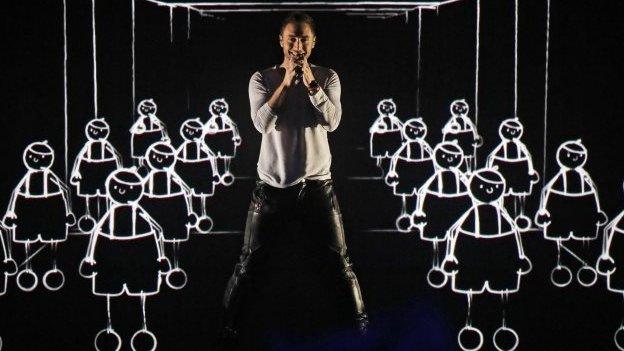
Sweden's Mans Zelmerlow had been the bookies' favourite since March
So that's it for another year. Sweden's Mans Zelmerlow has won the Eurovision Song Contest 2015 with his song Heroes.
Nothing is certain at Eurovision but Zelmerlow's win could never be described as a surprise.
He has been the bookies' favourite since he was selected to represent his country back in March.
That gives Sweden a sixth win, just one behind Ireland's record of seven.
As with all the best Eurovision numbers, his track had a message - the song and the interactive graphics that accompanied it were about the damage caused by bullying.
'Immensely proud'
In the press conference following his win, Zelmerlow explained that the little cartoon figure on screen during his performance was his 10-year-old self who had been bullied, with Zelmerlow playing the role of the real-life friend who saved him from his tormentors.
"We are all heroes, no matter who we love, who we are or what we believe in... we should stand up for the weaker in society and make them stronger," he said afterwards.
Of course, it could have been a very different story had Russia taken home the crown.
It was a three-horse race for much of the contest between Sweden, Russia and Italy before Sweden pulled away towards the end.
Russia were booed several times during the performance - at one point, a presenter reprimanded the audience, pointing out that the contest was about singing, not politics.
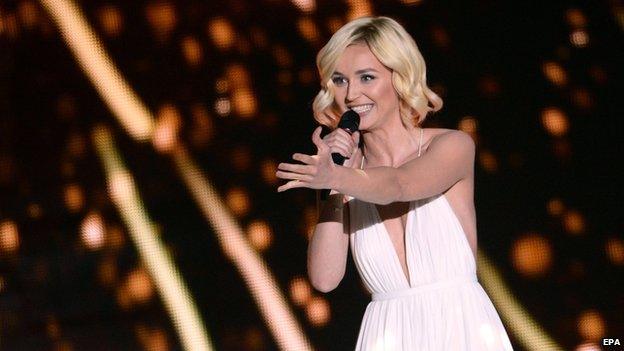
Polina Gagarina came second on the night
Polina Gagarina's A Million Voices ended up coming a creditable second, picking up lots of points from both sides of Europe.
Eurovision author and expert John Kennedy O'Connor said the Russian reaction was not unexpected: "The audience in the hall booed Russia every time they scored one of the top three marks, which clearly upset their singer.
"Whatever her government is doing, it has nothing to do with her. However, singing a song about peace, love and harmony on behalf of Russia appears hugely cynical. Perhaps some of the booing was justified for that reason."
The show itself went fairly smoothly, although there were a couple of technical hitches when the presenters tried to connect to Portugal, Estonia and Georgia for their votes.
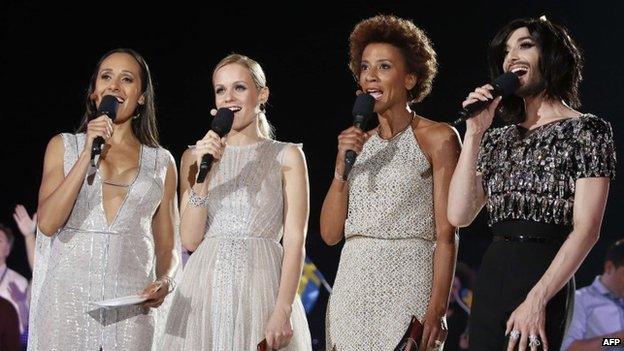
The show was hosted by Alice Tumler, Mirjam Weichselbraun, Arabella Kiesbauer and last year's winner, Conchita Wurst.
Dave Goodman, communications officer for the European Broadcasting Union (EBU), the event's organisers, said he was "really pleased with the show".
"We're immensely proud of the ESC as it celebrates its 60th anniversary. It's united Europeans for the last six decades and will continue to do so. It's more popular than it's ever been."
The show has gone truly global this year - it was shown live on YouTube for the first time and in China.
Unfortunately, it was the same old story for the UK - despite Electro Velvet's valiant efforts, Bianca Nicholas and Alex Larke came fourth from bottom with just five points.
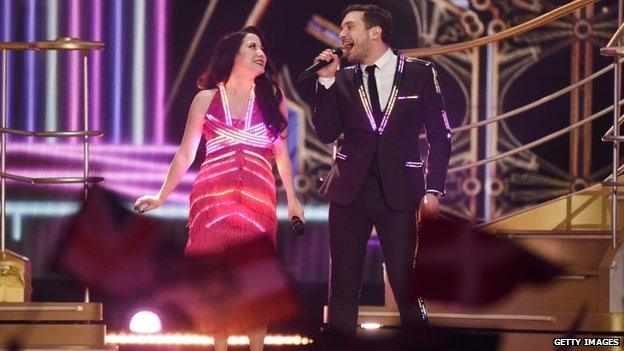
Bianca Nicholas and Alex Larke said that the result was "disappointing" but praised the winner Zelmerlow
"Obviously it is disappointing to finish on the right-hand side of the board but we have had the most amazing, brilliant, unforgettable time being part of this unique competition in this special year," the duo said in a statement.
"We put our hearts and souls into representing our country and would like to thank everyone back at home and around the world that got behind us, it really means a lot and of course we also want to congratulate Sweden and Mans Zelmerlow on their well-deserved victory."
But it could have been worse.
Building bridges
Austria became the first-ever host nation in the contest's history to score "nul points". Germany also ended up pointless.
So another anti-climax for the Brits. In fact, it's been a low key Eurovision all round.
Even in Vienna itself, the contest has felt quite contained - I was expecting to see the whole city embrace the vibe but it was been barely visible in places.
In fairness, the poor weather was probably partly to blame.
The contest itself was also a bit lacking in excitement, despite the Australians turning up for the party.
Lots of ballads - particularly in the latter half of the show - and hardly any gimmicks. Not a hamster wheel in sight.
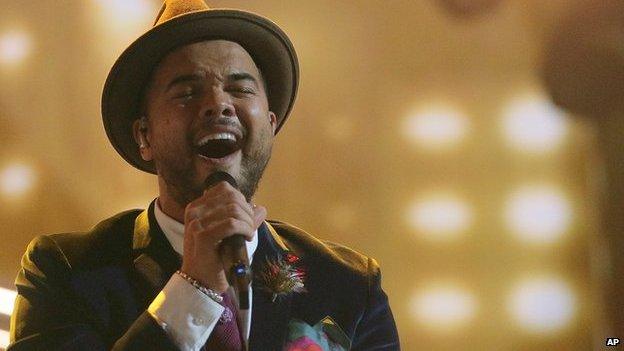
Guy Sebastian represented Australia and finished in a respectable fifth position with 196 points.
So did the contest "build bridges", the theme of this year's event?
Well, yes and no. Russia being booed for the second year running would certainly not have been in the EBU's plans.
But Simon Bennett, from the worldwide Eurovision fan club, OGAE International, believes it did: "The city of Vienna made a magnificent job of hosting the contest which has become something of a festival of tolerance. Conchita's victory seems to have had unexpected implications for the contest, promoting tolerance and equality.
"This year's show featured a disabled singer from Poland, a group from Finland with learning difficulties and a somewhat over-sized lady from Serbia singing about acceptance."
And so the baton passes to Sweden, with the host city still to be decided.
One thing is certain, gay Eurovision fans will be glad they'll be packing their bags for the spiritual home of Eurovision, rather than the possibly hostile Moscow.
Goodnight Vienna.